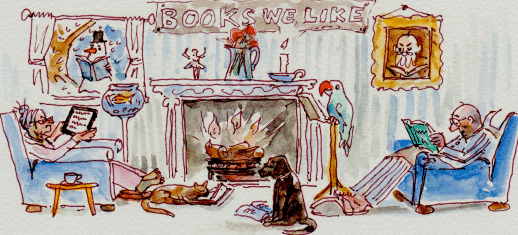Books
by Penelope Fitzgerald
|
At Freddie's |
A West End theatre school in the 60's, the National is at the Old Vic, TV an emerging force: a tawdry, makeshift backstage world nevertheless gives rise to theatrical magic. Pretentious directors, world-weary actors, irritating child hopefuls are there but it's the pupils, staff and above all its legendary principal who are centre stage. Missing the theatre? This evocation by an outstanding novelist will fill the gap. Written with humorous nostalgia, a dash of cynicism and penetrating insight.
(Tony Pratt - bwl 97 Summer 2020) |
|
|
Innocence |
This early novel set in Florence in the fifties is well worth seeking out. The story centres around an absurd and touching pair of lovers, the guileless daughter of the decrepit Ridolfi family and a fiery young doctor from the south. The book is full of wonderfully eccentric characters from the oh so practical English girlfriend to an Aunt who staffs a home for orphaned babies with lonely old ladies because they will love them.
(Jenny Baker - bwl 16 December 2002) |
|
|
Innocence |
Florence, 1955. Aristocratic Chiara, who wants to please everyone, and rising neurologist Salvatore from the south, who wants to prove he is unique, fall in love at first meeting. Their progress is hindered by helpful people: batty aunt, vague father, silent uncle, bossy school friend Barney who comes to Florence to sort things out . . . In this extremely funny and perceptive tale of tangled misconceptions Fitzgerald also gets details of time and place exactly right. Excellent!
(Annabel Bedini - bwl 39 April 2007) |
|
|
Offshore |
Set in 1960's Battersea Reach, Fitzgerald's short, early novel, a Booker prize winner, features a community of disparate characters living in houseboats or barely seaworthy former barges. They include a ramshackle painter, the highly organised unofficial leader of the fleet, a rent boy, a woman wondering if her husband will return and their two streetwise children. There is scruffy charm and some poignancy in the backwater life, and much passing interest to be had in everything from changing tides to comments on Whistler and Turner.
(Tony Pratt - bwl 98 Autumn 2020) |
|
|
The Beginning of Spring |
Moscow, 1913, Frank, an ex-pat Englishman, arrives home to discover his wife is en route for England with the children, only to abandon them at the nearest railway station. As winter is losing its grip so Frank is floundering, his well-meaning friends only adding to his confusion. Don't read it you're looking for derring-do and neat resolutions but if you enjoy pondering and peeling back layers, you'll be rewarded by a thought-provoking and often very funny read.
(Jenny Baker - bwl 88 Spring 2018) |
|
|
The Blue Flower |
To the dismay of both their families Fritz (the future Romantic poet Novalis) decides he's going to marry his 'heart's heat', twelve-year-old Sophie. Working round this historical fact, Fitzgerald draws us into late-eighteenth century Saxony, its extended families, their journeyings to and fro, their aspirations and fears, the intimate texture of their lives. She weaves a kind of magic without a single unnecessary word - I don't know how she does it, but it's truly wonderful!
(Annabel Bedini - bwl 61 Summer 2011) |
|
|
The Blue Flower |
After reading Hermione Lee's brilliant biography of Penelope Fitzgerald I've been discovering the novels. Based on the life of the young Fritz von Hardenburg (the German writer Novalis), living in Saxony at the end of the 18th century, this is both a love story and a fascinating account of local life at that time. The writing is economical, highly intelligent and amusing. The narrative rambles, but seems even more true to life for that.
(Victoria Grey-Edwards - bwl 76 Spring 2015) |
|
|
The Bookshop |
This, early, tale of a middle-aged woman opening a bookshop in an East Anglian village ends with such unmitigated sadness it's unkind to recommend it except for its clear-eyed (and often funny) evocation of an isolated community in the 1950s. Fitzgerald has an unerring instinct for the power-loving selfishness of 'proper' people intent on eliminating anything they have not thought of themselves, and the innocent, optimistic heroine's downfall rings all too true. It lived with me.
(Annabel Bedini - bwl 75 Winter 2015) |
|
|
The Bookshop |
I'd endorse Annabel Bedini's praise (bwl 75) for this compelling account of a widow's attempt to establish a bookshop. Boosted by the scandalous success of 'Lolita', it nevertheless runs into powerful opposition from the locals accustomed to running things. There is much comic irony but ultimately its spirited protagonist finds herself struggling with dark forces. If it all seems rather small scale, then that merely throws the skill of the writer into sharper focus. It's not how big the story is but how well it is told.
(Tony Pratt - bwl 103 Winter 2022) |
|
|
The Knox Brothers |
More Penelope Fitzgerald - a biography of her four brilliantly clever uncles who lived during the Victorian and Edwardian eras and both world wars. It is a lovely exploration of four very different, eccentric and funny as well as very clever men who loved words and games, and had careers in the church (fascinating insights into the various Anglican factions and changes), journalism and military intelligence. Interesting on the schools and universities of the times too.
(Victoria Grey-Edwards - bwl 77 Summer 2015) |
|
|

